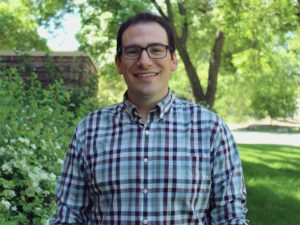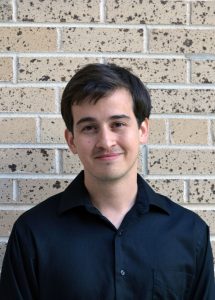Assistant professors Justin Sambur in the Department of Chemistry and Michael Mooney in the Department of Physics have each received a five-year, $750,000 research award from the U.S. Department of Energy (DOE).
A total of 50 scientists from U.S. universities and 26 scientists from DOE’s national laboratories were selected as recipients for the DOE Office of Science’s Early Career Research Program. In its 11th year, the program provides researchers with significant funding during the early years of their career, when many scientists do their most formative work.
JUSTIN SAMBUR LOOKING TO DOUBLE SOLAR ENERGY CONVERSION EFFICIENCY

The Sambur research group at CSU broadly focuses on the development of nanoscale materials for energy applications. Sambur’s DOE project looks to advance fundamental knowledge of the solar energy conversion processes in two-dimensional materials such as monolayer (ML) MoS2. The award will enable the group to build a new electrochemical microscope to investigate solar energy conversion processes in 2D materials. It will also support two Ph.D. students in the Sambur lab.
“I am so excited for our 2D materials team who have been working on this project since 2016,” Sambur said. “This award is really about the entire lab coming together and working toward a common goal. I owe everything to the hard-working students and postdocs who have been advancing our understanding of solar energy conversion processes in 2D materials.”
Currently, only about 33% of solar energy can be turned into electricity. The Sambur group looks to double that number with more efficient processes, first, by better understanding how to extract energy from materials before it is lost as heat. This understanding will help them to then design superior materials for energy applications, avoiding significant energy losses and potentially achieving 66% efficiency.
“The Department of Chemistry has set up a fantastic support system for junior faculty,” said Sambur. “My colleagues provide me with outstanding mentorship and support, and CSU is a special place for research and education. I am so grateful that I get to be a part of it.”
MIKE MOONEY WORKING TO ANSWER MAJOR QUESTIONS OF THE UNIVERSE

For Mooney, this award will support experimental work related to the Deep Underground Neutrino Experiment (DUNE) at the Long-Baseline Neutrino Facility as well as the Short-Baseline Neutrino (SBN) Program.
The DUNE project looks to address fundamental questions such as the origin of the matter/antimatter asymmetry in the universe. The SBN Program will investigate the anomalous phenomenon of neutrino oscillation over shorter distances that could lead to the discovery of “sterile” neutrinos, hypothetical particles that interact only via gravity.
A neutrino is a subatomic particle that is very similar to an electron but has no electrical charge and a very small mass. There are three types of neutrinos: electron, muon and tau. “Neutrino oscillation” occurs when a neutrino changes from one type to another during its travel through space.
Both DUNE and the SBN Program rely on precise measurements of electron neutrino interactions, which produce electromagnetic showers in Liquid Argon Time Projection Chamber (LArTPC) detectors.
“The energies of these electromagnetic showers must be well understood to achieve the main physics goals of each experiment,” Mooney said. “The primary objective of this research is to constrain the electromagnetic shower energy scale through precise calibration of detector effects and use of neutral pion decays to photons, which also produce electromagnetic showers in LArTPC detectors.”
Mooney will use this award to fund graduate students and a postdoc who will develop calibrations and detector hardware for the SBN and DUNE projects.
“I am very excited to receive this level of support,” Mooney said. “It will allow me to further establish myself as a leader in the neutrino physics community, working on some of the most exciting physics projects of our generation. The questions we are seeking to answer are so fundamental that we are bound to find some exciting answers, maybe answers to questions we weren’t even asking.”
DOE EARLY CAREER RESEARCH PROGRAM
According to the latest release on the Early Career Research Program, to be eligible for the DOE award a researcher must be an untenured, tenure-track assistant or associate professor at a U.S. academic institution, or a full-time employee at a DOE national laboratory, who received a Ph.D. within the past 10 years. Research topics can include advanced scientific computing, basic energy sciences, biological and environmental research, fusion energy sciences, high energy physics, and nuclear physics.